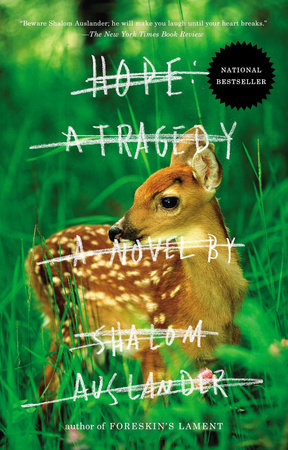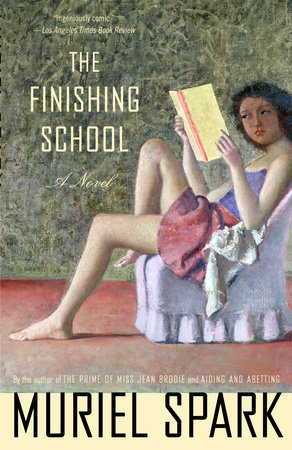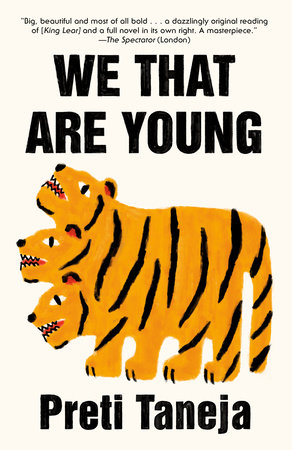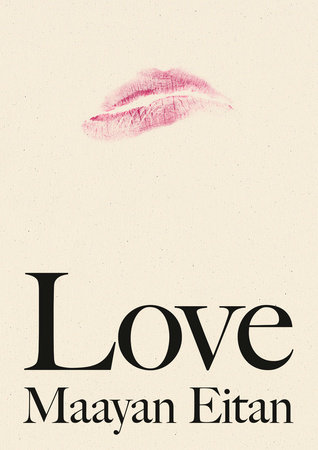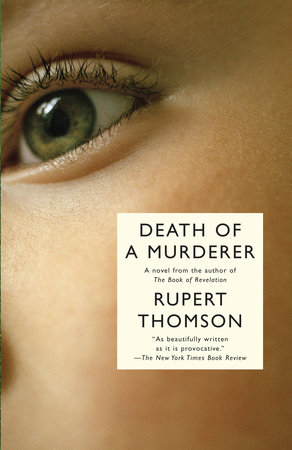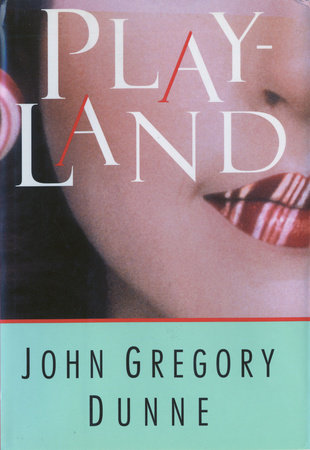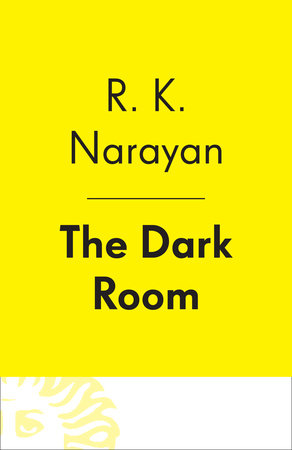Praise for Hope: A Tragedy
“Staggeringly nervy… Other fiction writers have gotten this fresh with Anne Frank. But they don’t get much funnier… [Auslander] is an absurdist with a deep sense of gravitas. He brings to mind Woody Allen, Joseph Heller and – oxymoron here – a libido-free version of Philip Roth… It’s a tall order for Mr. Auslander to raise an essentially comic novel to this level of moral contemplation. Yet Hope: A Tragedy succeeds shockingly well.” – New York Times
“Shalom Auslander is my kind of Jew — an unapologetically paranoid, guilt-ridden, self-loathing Diaspora kvetch, enraged by a God he can’t live with or without. While others of his generation may mine the tradition for a fond retrieval of forgotten lore, Auslander throws stones at the fiddler on the roof. He’s a black comic who’s alloyed the manic existential shtick of Lenny Bruce with the gallows humor that’s been a staple of the repertoire since the Babylonian Exile…. He is patently not good for the Jews…. A virtuoso humorist, and a brave one: beware Shalom Auslander; he will make you laugh until your heart breaks.” – New York Times Book Review
“Absurdist, hilarious … Part Sholom Aleichem, part Woody Allen, part homage to Philip Roth’s The Ghost Writer, it is a story of neurotic Jews, the problem of memory and the solace of suffering. “It’s funny,” begins the novel, and it is…. To hope, we must misremember. So we build structures of misremembering: We build fictions. Auslander’s first novel, Hope: A Tragedy: A Novel is a beautiful one.” — Cleveland Plain Dealer
“An irreverent (and how!), dark (to say the least), hilarious novel about a man who finds a beloved historical figure hiding in his attic.” — O, the Oprah Magazine
“A caustic comic tour de force.” — NPR
“There is an admirable fearlessness to Shalom Auslander’s writing . . . [His] ruminations and his clever inversions of conventional wisdom can challenge readers to re-examine opinions they probably take for granted, particularly regarding how the history of the Holocaust is remembered and taught.” – San Francisco Chronicle
“Scabrously funny…. Willfully outrageous, a black humorist with an Old Testament moralist’s heart… Angry, funny, shocking even, writing that strips away the niceties” – Los Angeles Times
“Poisonously funny…. Like an unintentional bark of laughter at a funeral.” – Entertainment Weekly
“The real tragedy would be to miss out on [this] debut novel, brimming with dark humor.” Entertainment Weekly’s Must List
“Blends tragedy, comedy and satire in the mold of Samuel Beckett and Franz Kafka.” – Wall Street Journal
“Grimly comic… relentlessly entertaining.” – Boston Globe
“Very funny; there is something very Wile E. Coyote about the ridiculous oppression that pursues Kugel… Vivid and very hard to stop thinking about.” – Forward
“The darkest of dark comedies. It’s as uncomfortably hilarious as it is shockingly offensive… Equal parts Philip Roth and Franz Kafka.” – Columbus Dispatch
“Brilliant… [An] open space for Auslander’s wild talent for gorgeously timed staccato rhythms.” – St. Louis Post-Dispatch
“Hilariously bitter and gloriously insensitive.” – WSJ.com
“There are echoes of Kurt Vonnegut, Philip Roth and even Franz Kafka in this wildly original novel. And yet with Hope: A Tragedy, Auslander has created a story that’s uniquely his, with something in it to offend, enlighten and ultimately touch just about anyone.” — BookPage
“Cultural anthropologists trying to figure out if there really is a recognizably Jewish voice and sense of humor, and if so, how it mixes and matches its key elements of self-deprecation, mordant compliance, hypochondria, and a total lack of surprise when disaster occurs, should consider Auslander’s debut novel….As funny as it is, the novel is also a philosophical treatise, a response—ambivalent, irreverent, and almost certainly offensive to some—to the question of whether art and life are possible after the Holocaust, an examination of how to ‘never forget’ without, as Kugel’s infamous attic occupant puts it, ‘never shutting up about it.’” — Publishers Weekly (starred review)
